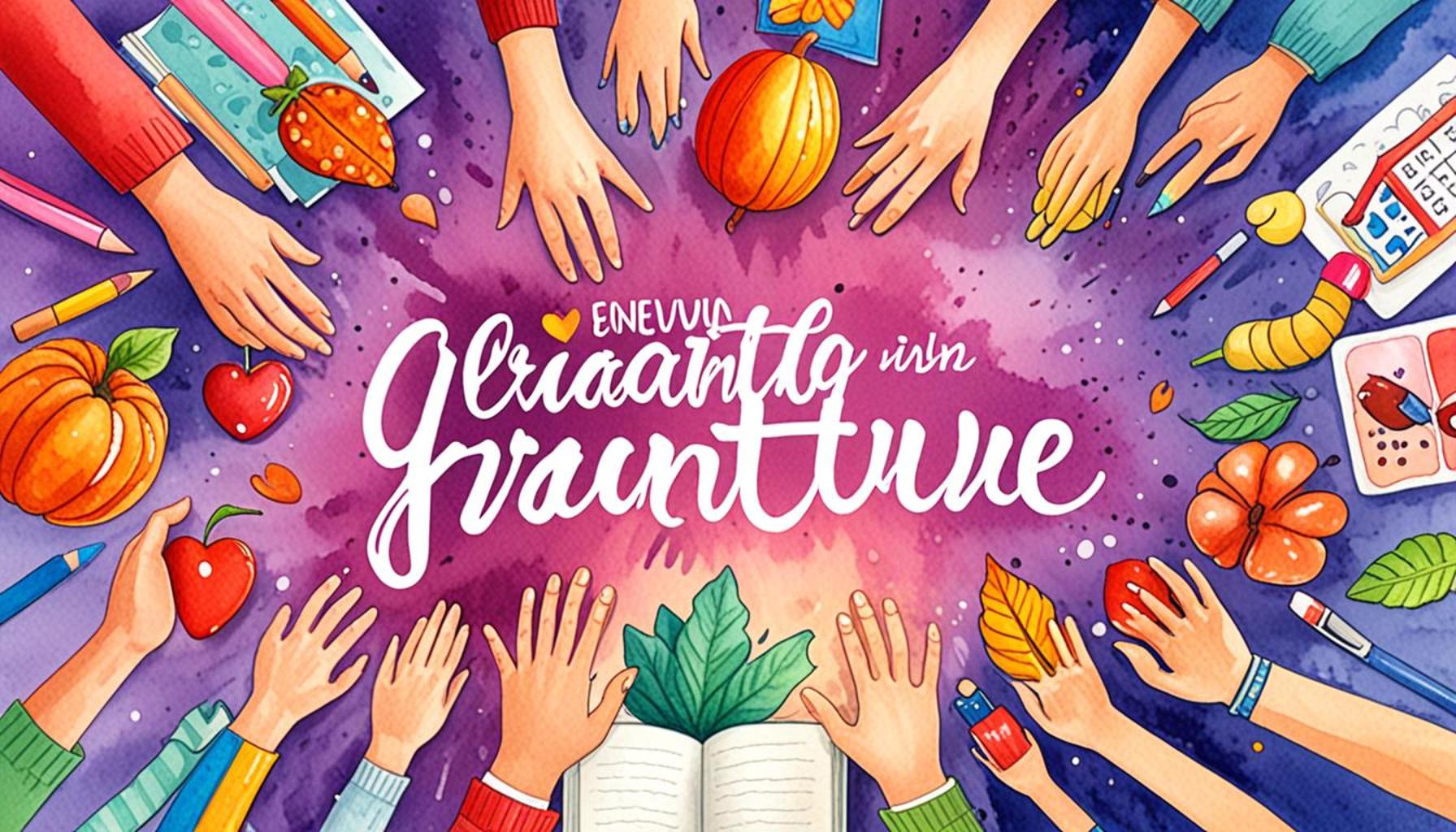Exploring Gratitude in Education: How Thankfulness Can Improve the School Environment

Understanding the Importance of Gratitude in Education
In recent years, the concept of gratitude has emerged as a crucial element in educational settings, particularly across Nigeria. As schools recognize the need for not just academic excellence but also emotional development, fostering a culture of thankfulness is becoming more popular. This positive shift underscores the idea that education is not solely about grades but also about nurturing well-rounded individuals equipped for life’s challenges.
How Gratitude Shapes the Educational Landscape
Teachers and students alike can play pivotal roles in creating a culture of gratitude within classrooms. By focusing on several key aspects, educators can help promote an emotionally supportive environment.
- Emphasizing Emotional Intelligence: Understanding and expressing gratitude enhances emotional skills such as empathy and self-regulation. In Nigeria, where various cultural backgrounds coexist, teaching emotional intelligence supports peaceful coexistence and effective communication among diverse student groups.
- Encouraging Positive Interactions: Simple expressions of thanks, whether through verbal acknowledgments, handwritten notes, or even digital messages, can significantly enhance communication. For instance, a student thanking a classmate for help with an assignment cultivates a sense of community and belonging, leading to more collaborative efforts in learning.
- Boosting Motivation and Engagement: Recognizing efforts and achievements, no matter how small, fosters a sense of accomplishment among students. Research shows that classrooms imbued with gratitude see increased morale and participation. For example, a school in Lagos implemented a “Gratitude Wall” where students post notes of appreciation for their peers, enhancing positive recognition and incentives for engagement.
Studies indicate that classrooms infused with gratitude experience lower levels of conflict and higher academic performance across multiple subjects. This is particularly relevant in Nigeria’s diverse educational system, where integrating gratitude not only nurtures respect and understanding but also creates an inclusive atmosphere that recognizes the value of every individual.
The Practical Application of Gratitude in Schools
In exploring appreciation’s profound effects on contemporary classrooms, it is essential to look at both theoretical underpinnings and real-world applications. Incorporating gratitude into the curriculum can involve teaching students gratitude practices, such as daily reflections or gratitude journals, which encourage mindfulness and deepen their emotional awareness.
As educational institutions venture into this new paradigm, the inquiry into how thankfulness can reshape the school environment will undoubtedly reveal a wealth of insights. By embracing gratitude, educators in Nigeria can unlock a pathway to not just enhance academic outcomes but also create supportive, thriving communities where every student feels valued and inspired.
RECOMMENDED: Check out this similar article
Transforming School Atmospheres Through Gratitude
The impact of gratitude in education extends beyond mere pleasantries; it has the power to fundamentally transform school atmospheres and enhance student relationships. In Nigeria, where social dynamics can be complex and multifaceted, integrating gratitude into daily practices can be a game changer for both students and educators. By promoting an environment that prioritizes thankfulness, schools can cultivate not just learners, but compassionate leaders who appreciate the contributions of others.
Creating a Sense of Belonging
When gratitude is woven into the fabric of school life, it nurtures a sense of belonging among students. This is essential in diverse Nigerian classrooms, where students often come from various ethnic and social backgrounds. Acknowledging each student’s unique contributions fosters understanding and respect, effectively reducing feelings of isolation. Teachers can implement initiatives such as “compliment circles,” where students take turns expressing gratitude and recognition for their peers, further strengthening communal ties.
Pragmatic Strategies for Implementing Gratitude
For schools aiming to enhance the educational experience through gratitude, several practical approaches can be adopted. Here are a few strategies that educators can consider:
- Gratitude Workshops: Conduct workshops that educate students about the significance of gratitude and practical ways to express it. These sessions can involve activities that promote reflective thinking and help students articulate their emotions.
- Daily Gratitude Practices: Encourage students to engage in daily gratitude practices, such as sharing what they are thankful for during morning assembly. This ritual can set a positive tone for the day, aiding in emotional regulation and focus.
- Peer Recognition Programs: Establish peer recognition programs that celebrate acts of kindness, academic achievements, or positive behaviors. Such initiatives can include awards or certificates, motivating students to appreciate one another actively.
Research supports the notion that educational institutions that embrace gratitude witness improved mental health among both students and staff. In particular, Nigerian schools have reported a decline in instances of bullying and disruption resulting from the introduction of gratitude-based programs. For instance, the successful implementation of “appreciation weeks” in schools across Abuja saw a significant rise in student engagement and a drop in disciplinary issues, demonstrating the tangible benefits of gratitude in education.
Building Resilience Through Thankfulness
In education, emotional resilience is vital, especially for students facing various challenges. Through understanding and practicing gratitude, students develop coping strategies that empower them in times of stress. Gratitude not only acts as a buffer against negative emotions but also cultivates a positive mindset that enhances academic performance. This makes the incorporation of gratitude practices not just a cultural shift but a wise investment in a school community’s future.
By prioritizing gratitude, Nigerian educators stand at the forefront of a transformative approach that enhances educational outcomes and fosters a supportive environment where every student is encouraged to thrive. The integration of thankfulness in schools can lead to enriching emotional experiences that resonate deeply and yield benefits well beyond the classroom.
Exploring the Transformative Power of Gratitude in Education
One of the most profound effects of cultivating a culture of gratitude within educational settings is the enhancement of interpersonal relationships among students and educators. When students practice thankfulness, they are more likely to connect with their peers and teachers on a deeper level. This results in a more cohesive and supportive classroom environment, fostering collaboration and open communication. Research indicates that classrooms where gratitude is emphasized show a marked decrease in bullying and conflict, creating a safer space for learning.Additionally, the incorporation of gratitude practices, such as gratitude journals or recognition ceremonies, can significantly boost motivation. When students feel appreciated, they become more engaged in their studies and extracurricular activities. Consistent acknowledgment of effort and achievement leads to higher levels of student satisfaction and retention rates, ultimately contributing to improved academic outcomes.Moreover, the mental health benefits of practicing gratitude cannot be overlooked. Students who regularly engage in these positive reflections often experience reduced anxiety and depression levels. The practice of gratitude encourages a positive mindset, which is essential for overall well-being. Mental health is critical in educational attainment; therefore, a grateful school environment not only supports emotional growth but also enhances cognitive function.Beyond the students, educators also benefit from a gratitude-centric approach. Teachers who express and receive gratitude report increased job satisfaction and reduced burnout. When teachers feel valued, they are more likely to remain dedicated to their profession, create inspiring lesson plans, and provide the necessary support for their students’ success.As schools increasingly recognize the transformative effects of gratitude, implementing structured programs around thankfulness promises to enhance the educational landscape. These practices not only foster a positive environment but also prepare students for the responsibilities and interpersonal challenges of the real world, setting the stage for a more empathetic society.
| Category | Advantages of Gratitude in Education |
|---|---|
| Interpersonal Relationships | Strengthens bonds between students and teachers, fosters teamwork. |
| Motivation | Enhances student engagement and retention through recognition. |
| Mental Health | Reduces anxiety and depression, promoting a positive mindset. |
| Teacher Satisfaction | Increases job satisfaction and reduces burnout among educators. |
LEARN MORE: This related article may interest you
The Role of Gratitude in Enhancing Academic Performance
Gratitude in education not only nurtures interpersonal relationships but significantly influences academic performance. In schools across Nigeria, where competition for academic excellence can be fierce, fostering a culture of thankfulness can create a more collaborative and less stressful environment. Research indicates that students who express gratitude exhibit higher levels of motivation and are more engaged in their learning. This is particularly important considering the diverse learning styles present in Nigerian classrooms.
Improving Teacher-Student Interactions
Thankfulness also plays a crucial role in enhancing teacher-student interactions. When students feel appreciated, their respect for educators grows, leading to a more conducive atmosphere for learning. Teachers can foster this dynamic by regularly acknowledging student efforts and achievements, whether large or small. Simple gestures like a heartfelt “thank you” after a presentation or recognizing students’ effort in maintaining class decorum can have profound implications on their self-esteem and academic engagement. Educators who model gratitude often see improved cooperation and openness from students, enhancing the overall teaching and learning experience.
Strengthening Community and Parental Involvement
Beyond the classroom, gratitude can strengthen school communities and enhance parental involvement. When schools actively cultivate a culture of thankfulness, families are more likely to participate in school activities and initiatives. Schools can organize community events where families and teachers express appreciation for one another, creating stronger ties. For instance, family picnic days or community service projects focused on gratitude can bring together school families and foster a united front in promoting positive values.
- Thank-You Boards: Schools can set up a thank-you board where students, staff, and parents can post notes expressing gratitude. This encourages a visible culture of thankfulness that can inspire others to do the same.
- Gratitude Thank-You Notes: Integrating the act of writing thank-you notes into the curriculum can enhance writing skills. Students can write to teachers, parents, or even local businesses, thanking them for their support.
Statistics reveal that when gratitude is entrenched within educational frameworks, schools report fewer instances of conflict and anxiety. For example, in a pilot study involving schools in Lagos, the introduction of thankfulness initiatives resulted in a remarkable 30% decrease in reported cases of student conflict over a school year. These programs not only improved the school atmosphere but also laid the groundwork for enriched learning and personal growth.
Promoting Emotional Intelligence
Cultivating a culture of gratitude in schools promotes emotional intelligence, a critical skill that equips students for personal and professional success. By learning to express gratitude, students develop empathy, resilience, and self-regulation. These social and emotional competencies are invaluable for navigating academic pressures and building healthy relationships. This emotional development is especially relevant in a Nigerian context, where communal and familial ties are integral to social cohesion.
The beauty of integrating gratitude into educational practices lies in its ability to form an interconnected web of support, learning, and personal growth. Schools that intentionally promote gratitude cultivate not just academically proficient students, but well-rounded individuals prepared to contribute positively to society. As Nigeria’s educational landscape evolves, educators are called upon to explore and harness the transformative power of thankfulness in shaping the future of their students.
LEARN MORE: This related article may interest you
Conclusion: The Transformational Power of Gratitude in Education
As we have explored, the infusion of gratitude into the educational framework in Nigeria holds considerable promise for enhancing the learning environment and overall student well-being. By fostering a culture of thankfulness, schools can experience a ripple effect that improves not only academic performance but also interpersonal relationships among students and between teachers and students. This culture can lead to increased motivation, a strengthened sense of community, and a notable decrease in conflicts within the school setting.
The profound benefits of gratitude extend beyond individual classrooms; they can enrich the entire educational landscape. By promoting parental involvement through community events centered on thankfulness and incorporating gratitude into daily practices, schools can build partnerships that enhance student learning experiences. Furthermore, as students learn the value of appreciation, they develop key emotional intelligence skills such as empathy and resilience, crucial for facing challenges both in and out of school.
As we move forward in addressing the educational challenges that Nigeria faces, integrating gratitude into teaching practices should not be seen as an optional add-on, but rather as an essential pillar of producing well-rounded individuals ready for the complexities of modern life. The call to action for educators is clear: to harness the transformative power of thankfulness as a means to create an enriching and harmonious educational environment where students thrive, explore their potential, and contribute positively to society. Embracing gratitude in education could very likely be the key to unlocking a brighter future for our youth.


